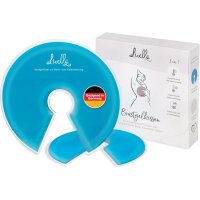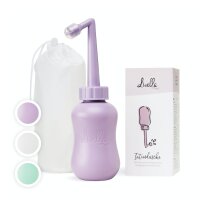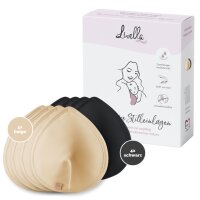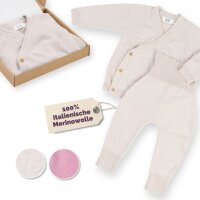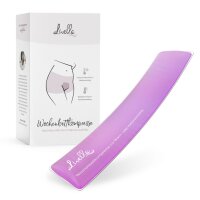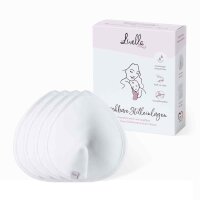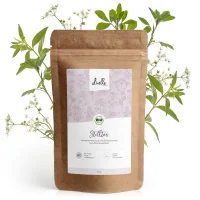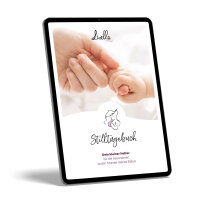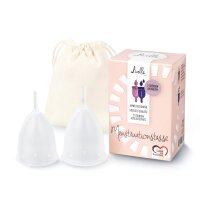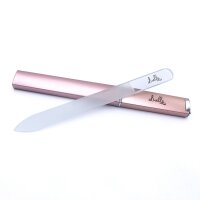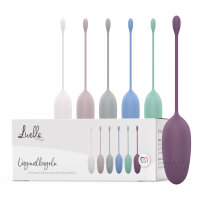Breastfeeding is generally considered the healthiest and best form of nutrition for babies. Yet many women are unsure about how long to keep nursing their offspring. Is it okay to continue breastfeeding a child beyond infancy? Is there such a thing as an upper age limit for breastfeeding?
Extended breastfeeding is a heavily discussed subject, not only among breastfeeding mums but also in society in general. The disagreements already begin when it comes to defining what is considered extended breastfeeding. While some define it as breastfeeding beyond six months of age, others argue that extended breastfeeding is breastfeeding that continues beyond the child’s first, second or even third birthday.
But why should mothers even consider giving their baby the breast for such a long time? What are the benefits of extended breastfeeding? And are there any disadvantages of breastfeeding after one year and beyond? Read on as we discuss the benefits and disadvantages of extended nursing and look at alternatives for mothers who decide against it.
Table of contents
What is extended breastfeeding?
How long is breastfeeding recommended?
What are the benefits of extended breastfeeding?
What are the disadvantages of extended breastfeeding?
Tips for making extended breastfeeding work
Weaning after extended breastfeeding
Extended breastfeeding: What are the alternatives?
What is extended breastfeeding?
There is no clear-cut definition of extended nursing. What counts as extended breastfeeding depends on several factors, but mainly on societal norms and cultural practices. In Western cultures, nursing a child beyond 12 or 24 months of age is usually considered extended breastfeeding.
For instance, many professional health organisations in the United States consider long-term breastfeeding to start after the child reaches 12 months of age. On a more general level, extended breastfeeding can be defined as breastfeeding that continues for longer than is usual in the respective culture.
How long is breastfeeding recommended?
There are many factors that influence the length of the breastfeeding relationship between mum and baby. They include the occurrence of common breastfeeding problems such as sore nipples as well as very pragmatic reasons for weaning such as the mother’s return to work. Regardless of individual circumstances, both the World Health Organisation (WHO) and UNICEF recommend exclusive breastfeeding for the first six months of life.
Thereafter, mothers should continue breastfeeding their children while introducing complementary foods starting from six months of age. The WHO suggests breastfeeding for up to two years—and even beyond. However, it’s up to mother and baby to decide for how long they keep breastfeeding.

What are the benefits of extended breastfeeding?
The benefits of extended breastfeeding are numerous. Keeping up breastfeeding for an extended period of time is beneficial to mother-baby bonding and also has several health benefits for mother and child.
For instance, mothers who nurse their baby for a long time have been found to be more empathetic towards their child and also more confident when taking parenting decisions. At the same time, extended breastfeeding makes your baby feel more secure and protected.
The health benefits of extended breastfeeding include:
- Lower risk of obesity and diabetes: Breastfed children are less likely to suffer from obesity or type 2 diabetes later on in their life. Breastfeeding can also reduce the risk of diabetes in the mother.
- Reduced risk of cancer: Mothers who breastfeed their child(ren) reduce their personal risk of developing cancers in the breast or ovaries. Diseases of the heart and blood vessels such as hypertension also occur less frequently.
- Stronger immune system: Breast milk contains many important antibodies that protect your baby against infections and promote the healthy development of the immune system. As a result, breastfed babies are less likely to suffer from stomach or ear infections. Diarrheal diseases, allergies and respiratory illnesses are also less common in children that have been nursed for an extended period of time.
- Accelerated weight loss: Breastfeeding, especially making breast milk, takes energy and hence burns additional calories. Mothers who nurse their baby therefore lose weight faster compared to mothers who decide against breastfeeding. A balanced breastfeeding diet can help lose the extra weight put on during pregnancy in a healthy way.
- Better brain development: Children who have been breastfed for an extended period of time have been found to have stronger cognitive skills.
What are the disadvantages of extended breastfeeding?
The benefits of extended breastfeeding for mother and child have been proven by numerous studies, with stronger attachment and reduced risk of certain diseases being the main reasons why many institutions recommend nursing a child beyond two years of age. But are there any downsides to nursing a child well into toddlerhood?
Despite the lack of scientific evidence, there is persistent prejudice against extended breastfeeding. For instance, some say that nursing beyond infancy can cause problems in the child’s emotional development or lead to dental problems later on in life. There are also claims that extended breastfeeding may have a negative impact on the baby’s growth.
In a position paper, the American Academy of Family Physicians (AAFP) writes quite explicitly: "There is no evidence that extended breastfeeding is harmful to parent or child." So the answer to the question “Is extended breastfeeding harmful?” should be a clear ‘no’. There are no negative consequences for either you or your baby that might prevent you from breastfeeding your baby for as long as you like.
In fact, the main downside of extended nursing is the social stigma that mothers are sometimes confronted with. Critical voices saying that breastfeeding for two years or longer is “unnatural” are hard to ignore, but it’s important to not be fazed by the critics.
Extended breastfeeding may not be common in industrialised countries, but anthropology has shown that there is no biological reason for weaning a child at a certain age. The right time for weaning depends on the child’s physical and psychological development and can be anywhere between two and a half and seven years of age, which is considered the natural weaning age.

Tips for making extended breastfeeding work
Dealing with the social stigma to which breastfeeding beyond infancy is often subjected is not the only challenge women need to overcome when breastfeeding for longer than usual. The biggest challenge that arises in this context is probably the compatibility of breastfeeding and work. Continuing to breastfeed after returning to work from maternity leave is anything but easy, but there are a few tips that can help you reconcile work and breastfeeding.
- Know your rights: Breastfeeding women enjoy legal protection in the workplace. One of the obligations employers have is to provide adequate facilities where mothers can get some rest and express and store breast milk.
- Choose a childcare facility close to work: A short distance between your place of work and your child’s nursing facility means that you can breastfeed during breaks.
- Arrange for flexible working hours: Flexible working hours make it easier to incorporate breastfeeding into your daily work schedule.
- Express breast milk for in-between feeds: In order to prevent low milk supply, you should express breast milk by hand. This way, other family members can bottle feed your little one when you are not available.
- Inform your employer: Your employer should know that you are breastfeeding. This will make it easier to make arrangements to accommodate your needs. Ideally, the information should be conveyed to the employer in written form.
Weaning after extended breastfeeding
Weaning describes the process of switching a baby from breast milk to solid foods. The weaning process after extended breastfeeding is no different to weaning that is initiated only a couple of months into the infant’s life. Basically, the idea is to breastfeed less and less until your baby doesn’t demand the breast anymore.
The most important thing is to stop breastfeeding gradually. This way, both you and your baby have time to adjust to the new reality. Plus, your body can regulate milk supply without there being any unwanted side effects such as blocked milk ducts or even mastitis when the breasts become overly full.
Probably the most difficult part of weaning after extended breastfeeding is to find the right moment. As long as you and your baby are happy to continue breastfeeding, then there’s no reason for weaning. However, as soon as you feel like breastfeeding doesn’t work for you anymore, you should consider stopping. Depending on your baby’s development, he or she might also lose interest in breastfeeding and start refusing the breast.
Extended breastfeeding: What are the alternatives?
Cultural norms, the return to work and the mother’s desire to have more time for herself can lead to extended breastfeeding simply not being an option. Since breastfeeding is known for having many benefits for the baby, including providing the infant with all the nutrients he or she needs for a healthy development, many mothers wonder how they can ensure that their little one gets all the important nutrients without breast milk.
If you stop breastfeeding after six months, it is recommended to switch to formula while simultaneously starting to introduce solid foods. Infant formula can be fed to babies up until one year of age—so-called follow-on formula is not needed. Feeding infant formula alongside complementary foods will ensure your baby gets all the necessary nutrients and has plenty of energy to develop well.
Verwendete Quellen
- Exploring and Influencing the Knowledge and Attitudes of Health Professionals Towards Extended Breastfeeding | Breastfeeding Medicine (liebertpub.com)
- Breastfeeding (who.int)
- Extended breastfeeding - HSE.ie
- The benefits and disadvantages of extended breastfeeding (medicalnewstoday.com)
- Breastfeeding Benefits Your Baby’s Immune System - HealthyChildren.org
- The Science of Breastfeeding and Brain Development | Breastfeeding Medicine (liebertpub.com)
- Breastfeeding, Family Physicians Supporting (Position Paper) | AAFP
- Breastfeeding and going back to work - NHS (www.nhs.uk)
- Protecting pregnant workers and new mothers - Rest and breastfeeding at work (hse.gov.uk)


